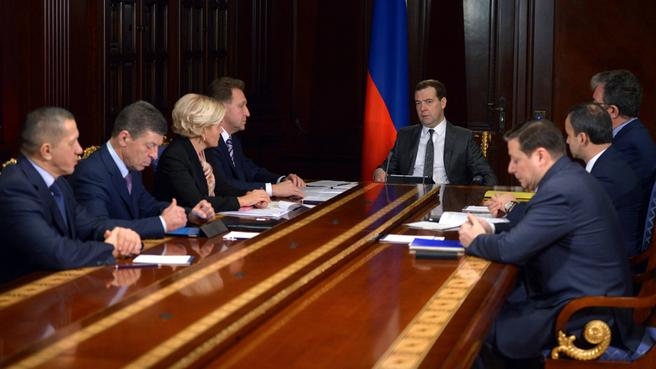Customs duties on meat and dairy imports. Construction of the high-speed Moscow-Kazan Railway.
Dmitry Medvedev: I’d like to say a few words about customs duties on
imports of meat products and whey. When we joined the WTO we made a commitment
to reduce import duties on some products, including food.
Nonetheless, to support domestic producers we were able to negotiate a deal that allows us to introduce quotas if there are similar products at significantly lower prices coming into the country.
As a member of the Customs Union and the Common Economic Space we cannot introduce these quotas without the consent of our partners, which currently include Belarus and Kazakhstan. We’ll have more partners in the near future. Last summer the Board of the Eurasian Economic Commission endorsed a common list of goods subject to tariff quotas and established the amount of imports to Russia allowed under these quotas. I’ve signed a Government resolution on the distribution of tariff quotas for meat products. How will this work?
Arkady Dvorkovich: The Eurasian Union adopted a decision on tariff quotas on 19 August. The quotas will be distributed at the first stage as follows – until 12 January, 25 percent will go to the companies that imported meat and dairy products from 2012 to the end of the third quarter of 2014. In April their distribution will depend on the results of the past three years, that is, until the end of 2014. So, the quotas will be distributed before the middle of next April.
No quotas will be introduced for countries from which meat and dairy imports are banned. If the ban is lifted, these quotas will be redistributed during the next period.
<…>
Dmitry Medvedev: Even in difficult times, we must do our best to ensure economic development. Last week, I chaired a meeting on building the high-speed Moscow–Kazan Railway. This will result in the creation of jobs and economic development, the involvement of Russia in global and transcontinental transport routes. The high-speed Moscow–Kazan Railway can become the first such a route. Basically this route should be included in our planned high-speed transport corridor to connect Moscow with Astana and Beijing.
We still have to come to a complete agreement on this ambitious project. Nevertheless, we consider the first stage to be important for us. The new railway could reduce travel time between Moscow and Kazan by 75 percent. Foreign investors, including our Chinese partners, are extremely interested in this project. I’ve discussed this issue with top Government officials. Our task is to quickly conduct surveys, to draft project documentation and to clarify the project’s financial model.
About six billion roubles’ worth of federal funding will be allocated for this purpose next year.
Indeed, this important project has an obvious multiplier effect.
<…>












